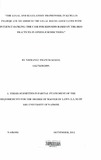| dc.description.abstract | Since the late 1990's the internet and other technological advances telecommunications, information technology and computer software and hardware have
transformed the provision of financial services and the structure of financial markets . Internet is increasingly used by banks as a channel for receiving instructions and delivering their products and services to their customers. The range of products and services offered by different banks vary widely both in their content and sophistication From the perspective of banking products and services being offered through internet, internet banking is nothing more than traditional banking services delivered through an electronic communication backbone, through the internet. But in the process it has thrown open issues which have ramifications beyond what a new delivery channel would normally envisage and hence has compelled regulators world over to take note of this emerging channel.
Some of the distinctive features of internet banking are:
1. It removes the traditional geographical barriers as it could reach out to customers of different countries. This has raised the question of jurisdiction of law /
supervisory system, to which such transactions should be subjected.
2. It has added a new dimension to different kinds of risks traditionally associated with banking, heightening some of them and throwing new risk control
challenges.
3. Security of banking transactions, validity of electronic contract and customers' privacy have assumed different dimensions given that internet is a public domain,
not subject to control by any single authority or group of users and
4. It poses a strategic risk of loss of business to those banks who do not respond in time to this new technology, being the efficient and cost effective delivery
mechanism of banking services. The world over, central bankers and regulators have been addressing themselves to meet the new challenges thrown open by this form of banking. The thrust of regulatory thinking has been to ensure that while the banks remain efficient and cost effective, they must be aware of the risks involved and have proper built-in safeguards, machinery and systems to manage the emerging risks. This can only be done guided by an appropriate
legal and regulatory framework to address the above legal and regulatory issues associated with internet banking. The central question for legal practitioners and
lawmakers revolves around how to accommodate the use of new technology in banking and financial services in the already existing law and how to regulate it from a concrete and clear legal perspective.
There is no specific law that deals with internet banking in Kenya. The Constitution and various Acts of Parliament capture different aspects of the law. The law applies generally without specific reference to electronic banking or internet banking. Accordingly, any legal and regulatory framework to govern internet banking should at the minimum revolve around the setting, enactment and enforcement of a set of laws comprising:
a) Law on Electronic and Digital Signature
b) Law or Regulation on third-party Certification Authorities
c) Laws or Regulations on e-Banking per se
d) Law on Data Privacy
e) Laws on Anti-Money Laundering.
The above set of laws will act as a benchmark when examining the current legal and regulatory framework governing internet banking in Kenya with a view of identifying the gaps and the legislative and regulatory reforms that are necessary to bring it at par with international best practices in other jurisdictions. | en_US |

